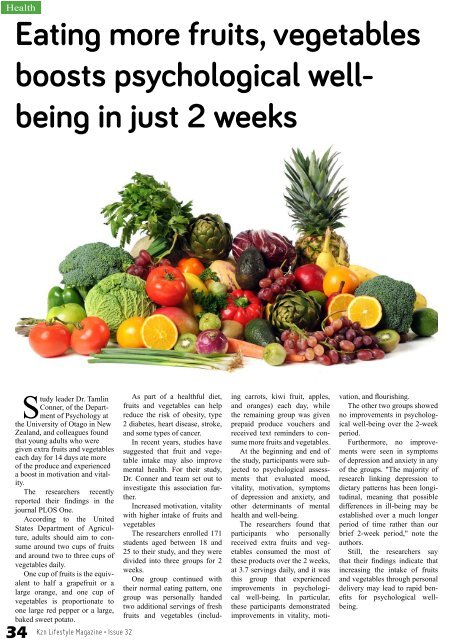KZN#32
You also want an ePaper? Increase the reach of your titles
YUMPU automatically turns print PDFs into web optimized ePapers that Google loves.
Health<br />
Eating more fruits, vegetables<br />
boosts psychological wellbeing<br />
in just 2 weeks<br />
Study leader Dr. Tamlin<br />
Conner, of the Department<br />
of Psychology at<br />
the University of Otago in New<br />
Zealand, and colleagues found<br />
that young adults who were<br />
given extra fruits and vegetables<br />
each day for 14 days ate more<br />
of the produce and experienced<br />
a boost in motivation and vitality.<br />
The researchers recently<br />
reported their findings in the<br />
journal PLOS One.<br />
According to the United<br />
States Department of Agriculture,<br />
adults should aim to consume<br />
around two cups of fruits<br />
and around two to three cups of<br />
vegetables daily.<br />
One cup of fruits is the equivalent<br />
to half a grapefruit or a<br />
large orange, and one cup of<br />
vegetables is proportionate to<br />
one large red pepper or a large,<br />
baked sweet potato.<br />
34<br />
Kzn Lifestyle Magazine • Issue 32<br />
As part of a healthful diet,<br />
fruits and vegetables can help<br />
reduce the risk of obesity, type<br />
2 diabetes, heart disease, stroke,<br />
and some types of cancer.<br />
In recent years, studies have<br />
suggested that fruit and vegetable<br />
intake may also improve<br />
mental health. For their study,<br />
Dr. Conner and team set out to<br />
investigate this association further.<br />
Increased motivation, vitality<br />
with higher intake of fruits and<br />
vegetables<br />
The researchers enrolled 171<br />
students aged between 18 and<br />
25 to their study, and they were<br />
divided into three groups for 2<br />
weeks.<br />
One group continued with<br />
their normal eating pattern, one<br />
group was personally handed<br />
two additional servings of fresh<br />
fruits and vegetables (including<br />
carrots, kiwi fruit, apples,<br />
and oranges) each day, while<br />
the remaining group was given<br />
prepaid produce vouchers and<br />
received text reminders to consume<br />
more fruits and vegetables.<br />
At the beginning and end of<br />
the study, participants were subjected<br />
to psychological assessments<br />
that evaluated mood,<br />
vitality, motivation, symptoms<br />
of depression and anxiety, and<br />
other determinants of mental<br />
health and well-being.<br />
The researchers found that<br />
participants who personally<br />
received extra fruits and vegetables<br />
consumed the most of<br />
these products over the 2 weeks,<br />
at 3.7 servings daily, and it was<br />
this group that experienced<br />
improvements in psychological<br />
well-being. In particular,<br />
these participants demonstrated<br />
improvements in vitality, motivation,<br />
and flourishing.<br />
The other two groups showed<br />
no improvements in psychological<br />
well-being over the 2-week<br />
period.<br />
Furthermore, no improvements<br />
were seen in symptoms<br />
of depression and anxiety in any<br />
of the groups. "The majority of<br />
research linking depression to<br />
dietary patterns has been longitudinal,<br />
meaning that possible<br />
differences in ill-being may be<br />
established over a much longer<br />
period of time rather than our<br />
brief 2-week period," note the<br />
authors.<br />
Still, the researchers say<br />
that their findings indicate that<br />
increasing the intake of fruits<br />
and vegetables through personal<br />
delivery may lead to rapid benefits<br />
for psychological wellbeing.

















